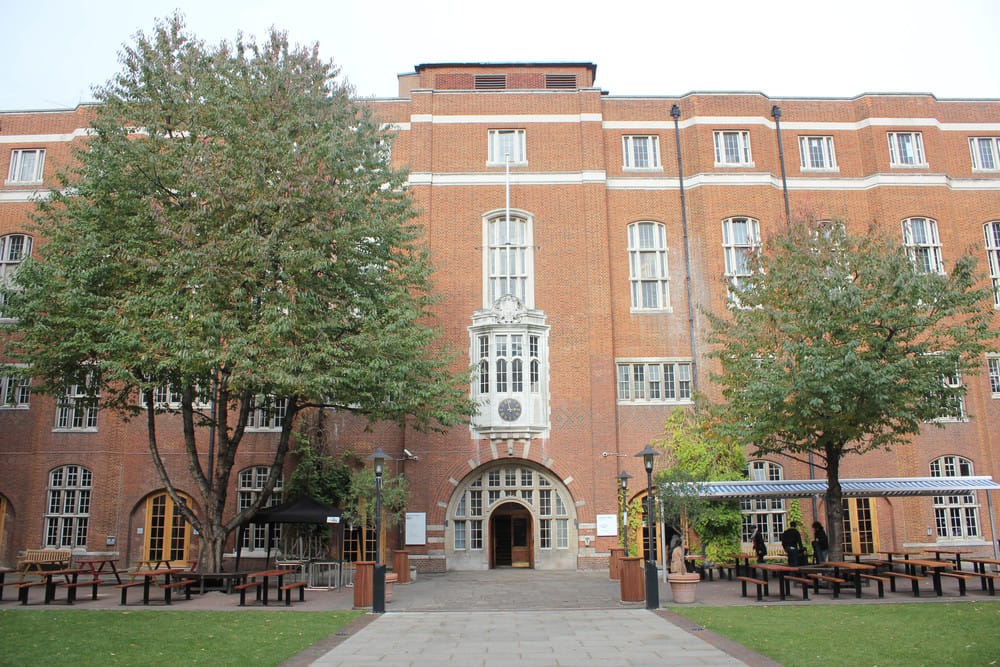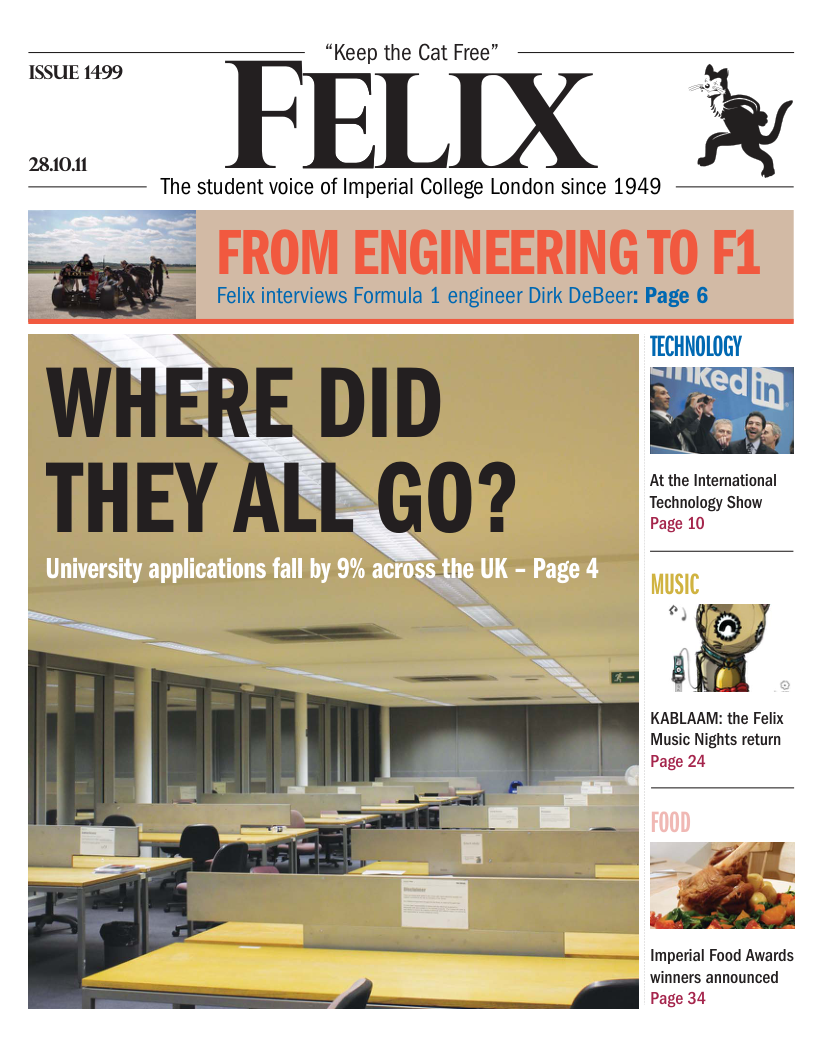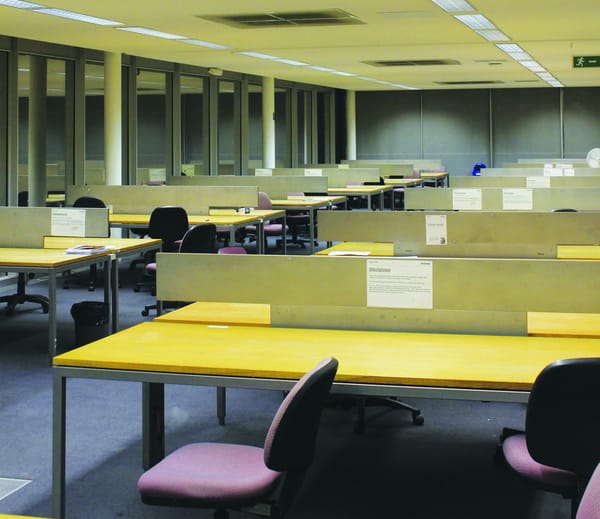Union first to provide response to NSS
Report unveils move towards better teaching and automated feedback

Imperial College Union has become the only student union in the UK to publish an official response to the National Student Survey (NSS). A poor performance in this this year’s NSS has been widely blamed for the College slipping 11 places in the Sunday Times League Table for 2012 entry. This was the first year of a new methodology, which places greater weight on the survey, being used to compile the table.
The report – written by Union President Scott Heath, Deputy President (Education) Jason Parmar and Representation Coordinator Andrew Keenan – summarises the NSS data in an easy to understand format and, in the words of Parmar, “provides 35 Union Recommendations to help improve the Student Experience at Imperial”. Parmar has written in his official blog that “the low results in the NSS reveal a genuine problem with the quality of teaching at Imperial” and added that he believes that “if college takes on board and effectively implements what this response from the Union and student body recommends, then we should see a dramatic increase in the quality of teaching and student satisfaction at Imperial College.”
The NSS Response reveals that while student satisfaction with teaching is 83%, comparable with previous years, a large number of students believe that staff have not “made the subject interesting”. This is attributed to “lack of variety in teaching methods, as well as our institutional stubbornness to embrace new technologies”. To combat this, the Union recommends “transparent and formal training for lecturers with biennial review” and “solidifying the claimed link between teaching ability and promotion”. Parmar has told Felix that it is widely accepted that “the route to professorship is that you have to teach”.
... [there is] a genuine problem with the quality of teaching at Imperial Jason Parmar – Deputy President (Education)
Further improvements could be achieved through “visible, prominent and prestigious” student-led teaching awards being extended to every department to incentivise high quality teaching. Additionally, implementing a “’You Say, We Did’ campaign within each department to promote changes in teaching as a direct result of Student On-Line Evaluation” would create “a powerful tool for spotting individual problems and successes” and would make students “feel that they can influence their course design”.
The Response also emphasises the need for blended learning and technological innovations. Heath has pointed out that while “part of the University’s [full] name is technology” it has “too often followed” others in this area. He gives Imperial being one of “the last to have a mobile app” as an example of this. He believes that “you can’t be number one if you follow” and that it is therefore “time to lead”.
As such the Union has recommended that the “College actively encourage and reward innovations in teaching methods”, pointing to the MSc in Strategic Marketing as a prime example. An appendix to the report, which is available on Parmar’s blog, outlines how handing out iPads to students on the course has improved communications between them and staff. It explains that “apps such as Goodreader allow students to make notes on the lecture slides during teaching [and) let them send annotations directly to lecturer so they can expand or explain points and send them after a lecture as a point for discussion in tutorials”. Coursework elements which incorporate “creating Wordpress blogs, making applications, building websites and filming videos” were also praised.
The report’s authors also believe that technological innovations may help the College in the area of Assessment and Feedback, in which it is currently ranked 163rd out of 168 by the NSS, with satisfaction at 54%. The Union recommends that “College and the Union work [together] on a major project: the creation of a feedback and assessment programme that simplifies and automates the process for staff and students”. The software would allow “a marker to instantly type or transcribe feedback for each student as they mark”. The report points out that this “would prevent administrative delay”, solve “issues of legibility of marker’s handwriting” and provide a “method of gathering reliable cohort-wide information”. Further suggested improvements in Assessment and Feedback include making “marker’s deadlines as compulsory as students’ submission deadlines” and regularly reviewing coursework to “ensure relevance … and to seek improvement”.
... transparent training for lecturers
The report also supports students building up soft and transferrable skills to aid with their Personal Development, with Heath saying he would like to see the implementation of a “transferable skills course” and “more group work and presentations” as part of students’ degrees. Academic Support could be improved by departments allocating “time and funding in Welcome Week to bring [academic] buddies together” and reforming the Personal Tutor system so that Tutors have regular meetings with their tutees and are “given access to information about their … academic progression”. The report points out that the suggested feedback software might again be of use here.
To allow the Union to oversee the implementation of these suggestions it has been recommended that “the Deputy President (Education) and the Union President … sit as full members of the Strategic Education Committee”. Queen’s University Belfast is currently the only other Russell Group University without student representatives on all academic committees. Heath has said that he believes that this change would be “very beneficial” and that student representatives are required “at every level” of the College educational structure.
Heath has said that the Response has, in general, “received the approval of senior College management”, though Parmar added that the issue of getting representation on the Strategic Education Committee was not looking “as promising as had been initially thought”. The Union is now in the process of meeting with senior staff in each department to discuss the proposals.





